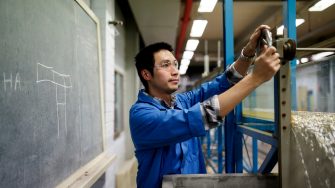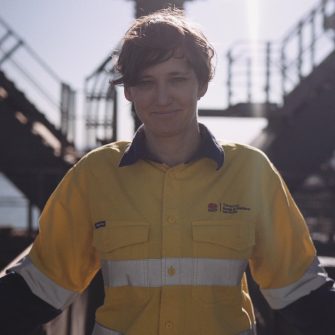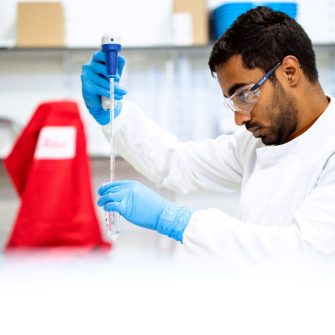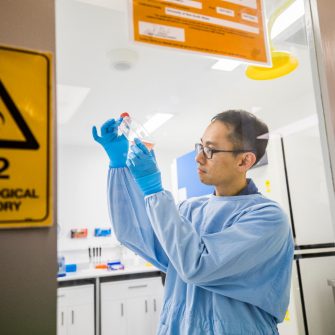Graduate Certificate in Mining Engineering
- Commencing Terms
- Term 1 & 3
- Duration
- 0.7 Year(s)
- Delivery Mode
- Face-to-face (includes blended)
- Campus
-
Kensington
- Codes
- Program code 7335
- CRICOS code 108475A
-
2026 Indicative first year full fee
- $22,500*
-
2026 Indicative full fee to complete degree
- $22,500*
-
2026 Indicative first year full fee
- $30,500*
-
2026 Indicative full fee to complete degree
- $31,000*

Application closures for 2026
International applications for all undergraduate programs, as well as postgraduate programs offered by the faculties of Arts, Design & Architecture, Engineering (excluding Master of Information Technology and associated programs) and Science are now closed to New Overseas Student Commencement (NOSC) for 2026 intakes.
Postgraduate programs offered by the Business School and the faculties of Law & Justice and Medicine & Health remain open. Master of Information Technology (and associated programs) also remain open.
- Overview
- Entry requirements
- What will I study?
- Future careers
- How to apply
- Fees & Scholarships
Overview
Mining engineering is the discipline of engineering that develops and executes the processes used to extract minerals from below and above ground. As a mining engineer you’ll work in the planning and management of engineering the extraction of mineral, petroleum and gas resources from the earth. Mining Engineers evaluate, plan and oversee the construction of a mine. They’re involved in a project through all phases of mining operations.
The Graduate Certificate in Mining Engineering is designed for those already working in the industry, or for people planning a career change. It provides foundational study in mining engineering and the opportunity for mining engineering graduates and minerals industry professionals to continue their professional development.
This is a more flexible entry mode for applicants who have qualifications in other technical disciplines, or relevant professional and/or responsibility in the mining experience, and vocational training. In this degree you’ll learn to analyse problems or issues, articulate appropriate solutions and justify proposals and professional decisions. You’ll also learn to communicate complex ideas in a variety of formats to diverse audiences and apply disciplinary principles and practices to new or complex environments.
Key features
You'll be studying in the renowned UNSW School of Minerals and Energy Resources Engineering, providing you with industry-led professional development and world-class equipment. When you study a Graduate Certificate in Mining you may be eligible to articulate to a Graduate Diploma Mining Engineering and then to a Masters in Mining Engineering.
Courses in this program may be delivered in either block mode (face-to-face or online) or offered fully online which allows you to balance continuing work with study.
Note: This program does not have CRICOS registration; it is not available for study on a Student Visa. International students on alternate visas may apply.
Why study at UNSW?
UNSW is renowned for its’ Mineral and Mining Engineering education. We're ranked #1 in Australia and #2 globally for Mineral and Mining Engineering (QS World University Rankings by Subject, 2025). The school has been leading the innovation of world-class education and research of petroleum and mining for more than 70 years.
We're also ranked #1 in Australia and #25 globally for Engineering and Technology. As well as this, all of UNSW's Engineering schools are ranked in the global top 50 with two schools ranked in the global top 10 for Engineering subjects (QS World University Rankings by Subject, 2025).
Australia’s top employers prefer our graduates over any other university. We're known for our graduate employability, with UNSW awarded the Most Employable students for six years in a row (Australian Financial Review (AFR) Top100 Future Leaders Awards, 2020–2025). We offer the largest range of teaching programs and comprehensive research interests.
We’re home to the best facilities in resources engineering in Australia. You’ll learn with state-of-the-art facilities including a VR simulator, computer laboratory and a rock mechanics laboratory for applied research into mining issues and water research.
We place significant focus on undertaking research and educating graduates who address climate change. Our areas of focus include CO₂ sequestration; improving efficiencies through digital rock analysis; generating clean energy through geothermal engineering; and research into space mining.
Our research strengths include:
- Sustainable Mining Practices
- Geomechanics
- Mining Systems and Mineral Processing
- Carbon Capture and Utilisation
- Natural Gas
- Enhanced Geothermal
- Digital Rock Physics
Our academics are experts in their fields and internationally respected and recognised. They work alongside our industry partners and government organisations to help solve the most complex problems facing the sector. With the industry evolving at a rapid pace, we have a leadership role in teaching and research excellence.
When you study at the School of Minerals and Energy Resources Engineering you can benefit from our student societies. MERESoc is well connected with industry, offering numerous networking opportunities throughout the year. Take advantage of professional development opportunities through social events and build your professional networks while you study.
Want to see more from UNSW Engineering?
Entry requirements
Entry to a Graduate Certificate will be considered on an individual basis for those with relevant mining industry experience (Entry 1) or for those re-training from other technical disciplines (Entry 2).
Entry 1 - Relevant mining industry experience with vocational training. A minimum of 4 years of full-time relevant professional and/or responsibility in the mining industry. Entry is considered for each individual based on portfolio supporting the application. An entry interview may be required.
Entry 2 - A degree in other technical disciplines from a recognised institution. The UNSW School of Mining Engineering defines other technical disciplines as Surveying, Accounting, Business, Economics, Information Technology/Systems, Biology and Pharmacy for example. A minimum of 1 year relevant industry experience is essential for applicants with a 3 year degree and is highly regarded for applicants with a 4 year degree. Entry is considered for each individual based on portfolio supporting the application, including details of relevant industry experience. Relevant industry experience is defined by the UNSW School of Mining Engineering as professional and/or industry responsibility in mining or mining associated services. An entry interview may be required.
The Graduate Certificate can be an entry point for obtaining foundational qualifications in Mining Engineering, and for articulating to a Graduate Diploma and a Masters degree, with satisfactory academic performance.
Recognised prior learning (RPL) may be available towards the program award for some courses within the program. A maximum of 6 UOC of RPL will be considered for applicants with a recognised degree in another technical discipline on application to the Program Authority. Approval will be considered according to the UNSW RPL Procedure with criteria including: equivalent course duration at a recognised institution, equivalent course content and assessment.
Additional Selection Criteria
Additional selection criteria for admission to this program:
- Portfolio
- Interview
- CV
A portfolio is to be provided to support the application for postgraduate coursework study, including the following:
- A cover letter explaining your motivation to work in the mining industry and proposed study program at UNSW. The letter should tell us about your interests and achievements and be no more than 400 words.
- A CV that provides information on industry responsibility including employer, dates employed in each position and a description of the position roles (no more than 50 words for each position).
- Information that demonstrates aptitude for learning and relevant experience including evidence and details of employer sponsored training and Vocational Education and Training (VET). This may include brief summaries (no more than 2,000 words total) of selected projects outlining your leadership and/or substantial contribution. Projects may include one or more of the following examples: mine safety responsibility, mine planning and production responsibility, technical or financial evaluations and reports (eg. risk management, strata control or slope stability or environmental assessments).
- Contact details of two referees, including at least one past or current employer. A letter from an employer verifying the role performed would be highly regarded to support the consideration of relevant industry experience.
- Certificates of relevant training including VET.
The portfolio is to be provided in electronic format directly to the UNSW School of Mining Engineering (postgrad.mining@unsw.edu.au) at the same time that your application for postgraduate coursework study is submitted to UNSW Apply Online. No hardcopy portfolios will be accepted. An entry interview may be required.
English language requirements
You may be asked to provide evidence of your English proficiency to study at UNSW depending on your educational background and citizenship. English language skills are vitally important for coping with lectures, tutorials, assignments and examinations - this is why UNSW requires a minimum English language competency for enrolment.
If you’re completing an Australian Year 12 qualification (e.g. NSW HSC or equivalent), you do not need to provide anything extra to prove your proficiency. Your qualification will be used as evidence of your English proficiency.
If you do need to provide evidence of your English proficiency, this will be indicated in your application. You can prove this by providing evidence that you meet one or more of the following criteria:
- English language tests and university English courses
- Prior study in the medium of English
- Other qualifications
If you need to improve your English skills before you start your degree, UNSW College’s Academic English Programs are for you. The programs are suitable for various English levels and help you prepare for university studies and life in Australia.
For more details, visit the English Language Requirements page.
Entry to a Graduate Certificate will be considered on an individual basis for those with relevant mining industry experience (Entry 1) or for those re-training from other technical disciplines (Entry 2).
Entry 1 - Relevant mining industry experience with vocational training. A minimum of 4 years of full-time relevant professional and/or responsibility in the mining industry. Entry is considered for each individual based on portfolio supporting the application. An entry interview may be required.
Entry 2 - A degree in other technical disciplines from a recognised institution. The UNSW School of Mining Engineering defines other technical disciplines as Surveying, Accounting, Business, Economics, Information Technology/Systems, Biology and Pharmacy for example. A minimum of 1 year relevant industry experience is essential for applicants with a 3 year degree and is highly regarded for applicants with a 4 year degree. Entry is considered for each individual based on portfolio supporting the application, including details of relevant industry experience. Relevant industry experience is defined by the UNSW School of Mining Engineering as professional and/or industry responsibility in mining or mining associated services. An entry interview may be required.
The Graduate Certificate can be an entry point for obtaining foundational qualifications in Mining Engineering, and for articulating to a Graduate Diploma and a Masters degree, with satisfactory academic performance.
Recognised prior learning (RPL) may be available towards the program award for some courses within the program. A maximum of 6 UOC of RPL will be considered for applicants with a recognised degree in another technical discipline on application to the Program Authority. Approval will be considered according to the UNSW RPL Procedure with criteria including: equivalent course duration at a recognised institution, equivalent course content and assessment.
Additional Selection Criteria
Additional selection criteria for admission to this program:
- Portfolio
- Interview
- CV
A portfolio is to be provided to support the application for postgraduate coursework study, including the following:
- A cover letter explaining your motivation to work in the mining industry and proposed study program at UNSW. The letter should tell us about your interests and achievements and be no more than 400 words.
- A CV that provides information on industry responsibility including employer, dates employed in each position and a description of the position roles (no more than 50 words for each position).
- Information that demonstrates aptitude for learning and relevant experience including evidence and details of employer sponsored training and Vocational Education and Training (VET). This may include brief summaries (no more than 2,000 words total) of selected projects outlining your leadership and/or substantial contribution. Projects may include one or more of the following examples: mine safety responsibility, mine planning and production responsibility, technical or financial evaluations and reports (eg. risk management, strata control or slope stability or environmental assessments).
- Contact details of two referees, including at least one past or current employer. A letter from an employer verifying the role performed would be highly regarded to support the consideration of relevant industry experience.
- Certificates of relevant training including VET.
The portfolio is to be provided in electronic format directly to the UNSW School of Mining Engineering (postgrad.mining@unsw.edu.au) at the same time that your application for postgraduate coursework study is submitted to UNSW Apply Online. No hardcopy portfolios will be accepted. An entry interview may be required.
English language requirements
You may be asked to provide evidence of your English proficiency to study at UNSW depending on whether you are from an English-speaking background or non-English speaking background. English language skills are vitally important for coping with lectures, tutorials, assignments and examinations - this is why UNSW requires a minimum English language competency for enrolment.
If English is not your first language, you’ll need to provide proof of your English proficiency before you can be given an offer to study at UNSW. You can do this by providing evidence that you meet one or more of the following criteria:
- English language tests and university English courses
- Prior study in the medium of English
- Other qualifications
If you need to improve your English skills before you start your degree, UNSW College’s Academic English Programs are for you. The programs are suitable for various English levels and help you prepare for university studies and life in Australia.
For more details, visit the English Language Requirements page.
Check the specific English language requirements for this program
What will I study?
UNSW is introducing a new academic calendar from 2028.
We are moving to a new flex-semester calendar. What does this mean for your studies?
Full program structure
The Graduate Certificate in Mining is a program made of up 24 units of credit. It consists of four courses, that can be studied in a full-time or part-time load.
Upon completion of the Graduate Certificate in Mining you may be eligible to articulate into the Graduate Diploma in Mining Engineering or Master of Mining Engineering.
-
- Fundamentals of Mining Engineering
- Mine Processes, Systems and Analysis
- Hazard Identification, Risk and Safety Management in Mining
- Postgraduate Coursework Research Skills for Engineers
Future careers
Our graduates work with advanced technologies that support clean energy and the efficient supply of mineral resources. They’re innovators, taking these new ideas and technologies into their industries and driving change.
Depending on your prior study and areas of specialisation there are a number of unique roles in the Mineral Energy Engineering Resources sector you can pursue. By combining a Graduate Certificate in Mining with an Bachelor’s degree from a related discipline you can give yourself a unique skillset that sets you apart from other mining graduates.
How to apply
Applications must be submitted through our Apply Online portal. We encourage you to submit your completed application as early as possible to ensure it will be processed in time for your preferred term. Some high-demand programs and Faculties with limited places may have an earlier application deadline or commencement date. Find out more.
Ready to start your application?
For most international students, applications are submitted via our Apply Online service. We encourage you to submit your completed application as early as possible to ensure it will be processed in time for your preferred term.
Some high-demand programs with limited places, may have an earlier application deadline or may have an earlier commencement date. For details, visit the international admissions information page.
Ready to start your application?
Fees & Scholarships
*Fees are subject to annual review (or when required) by the University and may vary accordingly.
Indicative fees are a guide only and have been calculated based on the typical enrolment patterns of students undertaking the program. The indicative fees listed here is an estimate for tuition only and excludes non-tuition fees and charges. The amount you pay will vary depending on the calendar year of enrolment, the courses you select and whether your study load is more or less than 1 Equivalent Full Time Student Load (48 units of credit (UOC) per year).
You should not rely on indicative fees as fee increases are assessed when required and may exceed the indicative figures listed here. Actual fees are calculated on enrolment. More information on fees can be found at the UNSW fees website.
*Fees are subject to annual review by the University and may increase annually, with the new fees effective from the start of each calendar year. The indicative fees listed here are based on an estimated average and are for tuition only, other fees and charges are not included. The amount you pay will vary depending on the calendar year to enrol, the courses you select and whether your study load is more or less than 1 Equivalent Full Time Student Load (8 courses per year).
Indicative fees are a guide for comparison only based on current conditions and available data. You should not rely on indicative fees. More information on fees can be found at the UNSW fees website.
Indicative fees to complete the program have been calculated based on a percentage increase for every year of the program. Fee increases are assessed annually and may exceed the indicative figures listed here.
Indicative fees to complete the program include tuition plus an estimate of study-related costs of approximately $1,000 per year. To find out more about other costs, visit UNSW International.
Scholarships
At UNSW, we award over $83 million in scholarships each year. We pride ourselves on rewarding excellence and making university accessible to students from all walks of life. Whether you’re a domestic or international student, our range of scholarships, prizes and awards can support your journey.
Featured scholarship
The UNSW Women in Engineering Research Scholarship was established to assist women of high academic achievement with an interest in a research and/or an academic career in engineering. UNSW Engineering offers two Women in Engineering Top-up Scholarships every semester.
Progress starts here – at a world-leading university

Top 20 Worldwide
Ranked in the global top 20 for three consecutive years
QS World University Rankings, 2024–2026

Winner of the AFR Most Employable University Award six years in a row
AFR Top100 Future Leaders Awards, 2020–2025

Australia's #1 for Innovation
Highest number of startups and spinouts from university-developed tech
SCOPR report, 2024




